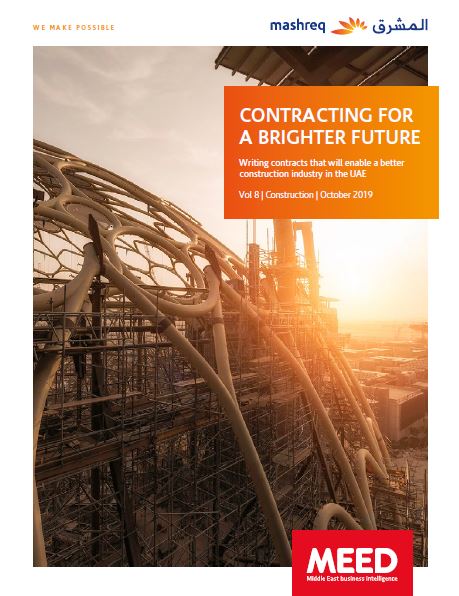Contracting for a brighter future

New report from MEED, in partnership with Mashreq, examines the issues surrounding contracts, and discusses the ways in which contract writing can be improved to support a more sustainable industry |
Any investigation into the challenges facing the construction industry tends very quickly to come down to a discussion about the types, terms and fairness of contracts.
A contract sets out the responsibilities and duties of the contracted parties. It defines the rules of engagement between the client and its contractors should any disagreement arise. A well-written, easy-to-use contract with fairly balanced ownership of risk can be a key success factor on a difficult project. A bad contract can turn a small on-site disagreement into a major dispute that can impact the delivery of a project and even the future of a company.
The construction phase of a project is typically the period that carries most risk. It is when the greatest uncertainties exist, such as technical challenges arising from unforeseen ground conditions, or late changes to the design by a client. Overlapping trade packages or international supply lines can add logistical complexities that are vulnerable to a multitude of events beyond the control of project personnel.
A well-written contract will allow for such problems and define clearly how the risk from these unexpected circumstances is shared between the client and its contractor, and how any disputes over cost overruns might be resolved.
There are three common criticisms of construction contracts in the region. The first is that they are often badly written and ambiguous. In addition, some construction clients demand arbitrary changes to a design without any formal documentation.
 A second common complaint is the exclusion of the contractors from the early design phase of a project, which can lock construction problems into the design that could have been avoided with greater collaboration.
A second common complaint is the exclusion of the contractors from the early design phase of a project, which can lock construction problems into the design that could have been avoided with greater collaboration.
But the most commonly voiced concern is the unfair balance of risk. Contractors often carry almost all of the construction risk, with only limited ability to control some of these risks. This extends to the open-ended, on-demand performance bonds held by a project client that can be cashed in without agreement. Refusing such terms can translate into a struggle to win work for the contractors.
At the same time, new risks are emerging from the increasing adoption of advanced digital data technologies such as building information modelling (BIM) and smart contracts. These technologies are introducing new processes and relationships that are not covered by traditional contracts.
Responding to these developments provides an ideal opportunity to rethink the way construction contracts are written in the UAE. Better written, fairer contracts will support a more sustainable industry that can drive innovation, skills and growth in the UAE.
Click here to download the report.
*Follow Mashreq Corporate and Investment Banking Group on LinkedIn for regular updates, thorough market knowledge, and insights.


